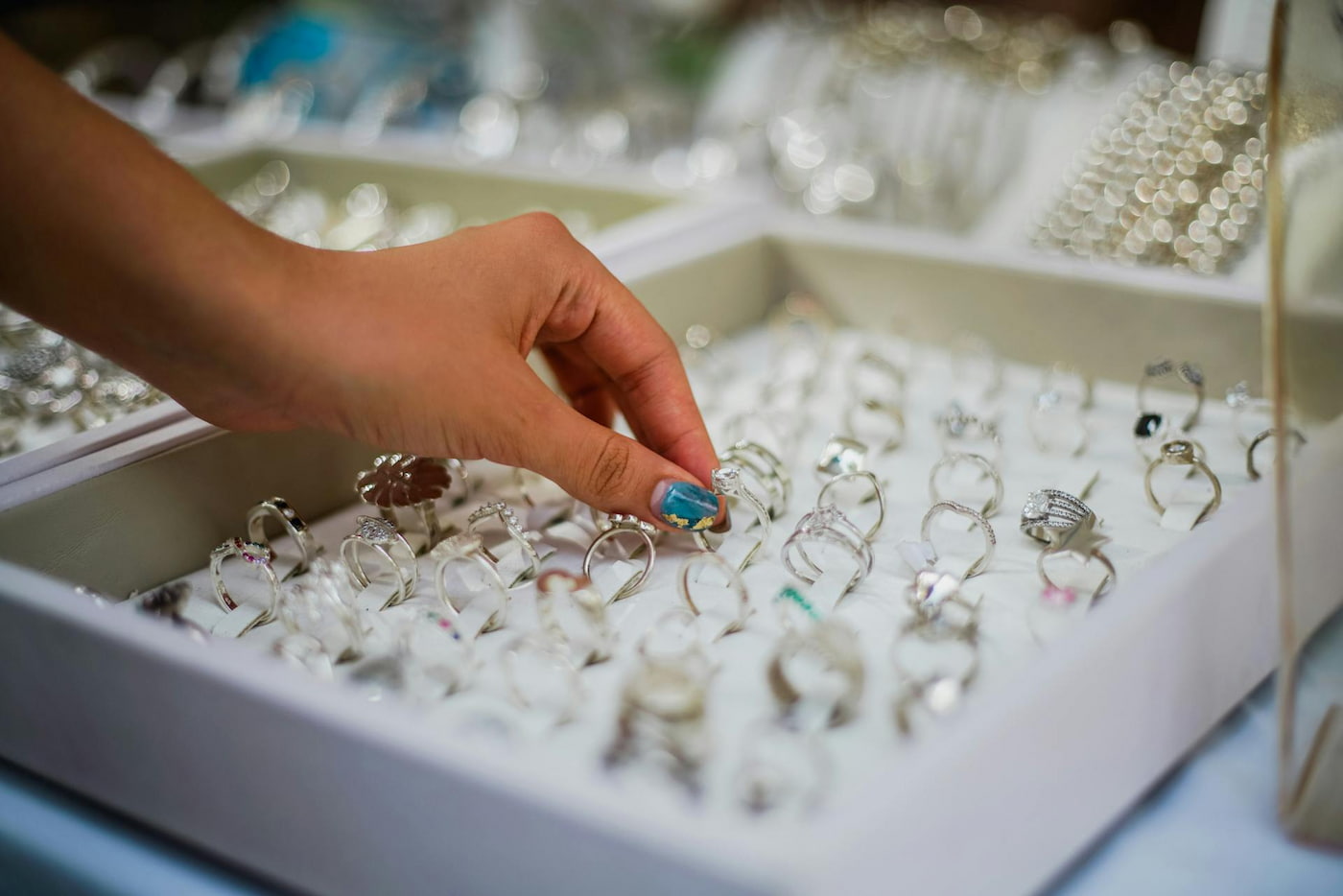How to open a jewelry store
Editorial Team
7 min read
Jewelry shops can be a great addition to almost any shopping district or town. What’s more, a sentimental piece of jewelry can add sparkle to many occasions–from birthdays and anniversaries to Christmas and other gifting holidays.
If you’re thinking of opening a jewelry store, here are a few things to consider as you map out your business.
1. Define your jewelry niche
Before starting a jewelry business, you’ll need to zero-in on the type of jewelry you’d like to sell. Jewelry products range from low-ticket items made with affordable materials like plastic beads to high-ticket items made from precious metals and gemstones. For instance, costume jewelry is often made from non-precious materials like copper, glass, and synthetic stones. Fine jewelry, on the other hand, is typically made up of precious metals like silver and gold and may provide the setting for gemstones like diamonds, emeralds, and rubies. Made to last, fine jewelry can be passed down from generation to generation, if the jewelry is maintained well.
Some small business jewelry stores even focus on offering specific categories of jewelry or fashion accessories–think jewelry for piercings, chains of all sorts, or rings or necklaces in almost any size or shape.
2. Research the market and build a jewelry store business plan
Next, begin market research to help you further understand your potential customers, your competition, the market you plan to open in, and even what products may best suit your target market and customers.
Consider who your ideal customer is. Do you want a younger or older crowd? Are you trying to target young professionals? Look at customer demographics and similar businesses in the town or neighborhood you plan to open your jewelry business.
This research will inform your jewelry store business plan. Further, you can use this research phase to zero-in on your target location, how much it’ll cost to rent a retail location, and how you’ll acquire and manage your inventory.
As you build out your business plan, you should include these sections:
- A company description that captures your company’s goals, mission and objectives, including the proposed structure for your business–for example, whether it’s a sole proprietorship, LLC, or other business structure.
- A product description and how you intend to source or manufacture those products.
- An analysis of the market and your competition.
- A financial forecast and projections, providing a summary of how you think your business will perform in its first few years and the type of financing you’ll need to support your business goals. Learn why forecasting is crucial to your business plan.
Once you have a business plan and are sure that you’d like to move forward with opening a jewelry business, you can pick a legal structure for the business, like an LLC, for instance, and register your jewelry business in the city and the state you’re located in.
Remember, too, that your business plan is crucial to getting the funding you may need to launch your jewelry business. Be sure to check out these helpful reads for more insights on securing business funding:
- How should you fund your small business? Here’s how to choose.
- How to start a business with no money
- Federal funding for small businesses: Understanding the state small business credit initiative
3. Find a site for your jewelry store
Deciding on where to set up your jewelry shop can depend on several considerations. Take these questions, for instance:
- Where would you like to live and work (assuming you’ll be onsite to run your shop)
- How much can you afford for renting the space? (Have you included utilities, insurance, if applicable, and other site-related costs in your budget?)
- How much remodeling or repair work is needed to get the space ready for opening day?
- Is the area you’re considering well populated?
- What is the traffic pattern of that location? Is there easy in-and-out access and sufficient parking?
- Is the venue accessible to foot traffic? Is it accessible to wheelchairs or other mobility devices?
- What businesses are operating in the surrounding area? Do those businesses draw customers who’d be interested in the kinds of jewelry products you plan to sell?
READ: How to find a good location for your business
4. Acquire and organize your inventory
Before you can open up your shop, you’ll need to source, purchase, and organize your jewelry supplies and inventory. Make sure to set a budget for your inventory and supplies and try to stick to it. Give special consideration to the kinds of pieces that are most likely to sell or appeal to your market, and be sure to have enough inventory on hand or easily accessible to accommodate customer demand. Remember that the items you open your store with will likely determine your customers’ first impression of your store, your brand, and whether or not they’re likely to purchase from you again.
To help you set up and manage your inventory, choose a point of sale (POS) system. It’s important to note that, at a minimum, your POS system should help you offer a variety of payment methods to your customers. A Clover POS system, for instance, can help you manage sales and important operational functions more efficiently, like inventory, employees, customers, and even sales tax. Having one system that simplifies sales, inventory, and operations can be especially useful while you’re learning the ropes of owning and running a new business.
5. Build a marketing plan to stand out from the competition
Once you’ve found a location and sourced your inventory, you’ll need to build a marketing plan that announces your opening and entices customers to visit your shop. Your marketing plan should also capture the tactics you plan to use to reach your sales goals and retain customers.
As you build out your marketing plan, here are a few ideas you can consider and customize to your location and community.
Promote your new business online. Social media and a business website can be a great way to get the word out about your new business at a relatively low cost, so be sure to set up social media accounts where you can show off your jewelry and offer shoppers sneak peeks at new products, events, or even coming sales. What’s more, be sure to create a business website that accommodates online sales and helps you share more information about your business with potential customers. Your About Us page can offer
Offer community workshops: Try teaching simple jewelry making classes at your business location. Customers can leave with a custom piece that they love and learn more about your store. Workshops could also feature themed events, like holiday-themed events, or specific styles or pieces of jewelry.
Host events that fit your space: Jewelry is beautiful and artistic, so consider co-hosting something like a mini art exhibit with local artists or other local businesses that focus on accessories. It could mean more opportunities to connect with potential customers that already shop and attend events in your area.
Lean into holidays and themes: Tailor sales and events to gift-giving holidays like Valentine’s Day. You can also use themes to inspire classes, like making Valentine’s Day jewelry for your sweetheart or making custom pieces with a loved one.
Starting a small business can be challenging—but worth the effort. Clover’s POS systems for jewelry stores can help you manage your jewelry business more easily and efficiently–and set up’s a snap. Contact a Clover Consultant anytime for more information.
Related Posts
How to attract new customers to your salon
Redesign your mental model: Forget resolutions and reshape habits
Popular Topics
Stay in touch
Sign up and learn more about Clover.
Thank you for your subscription!
More posts about starting a small business
eBook





